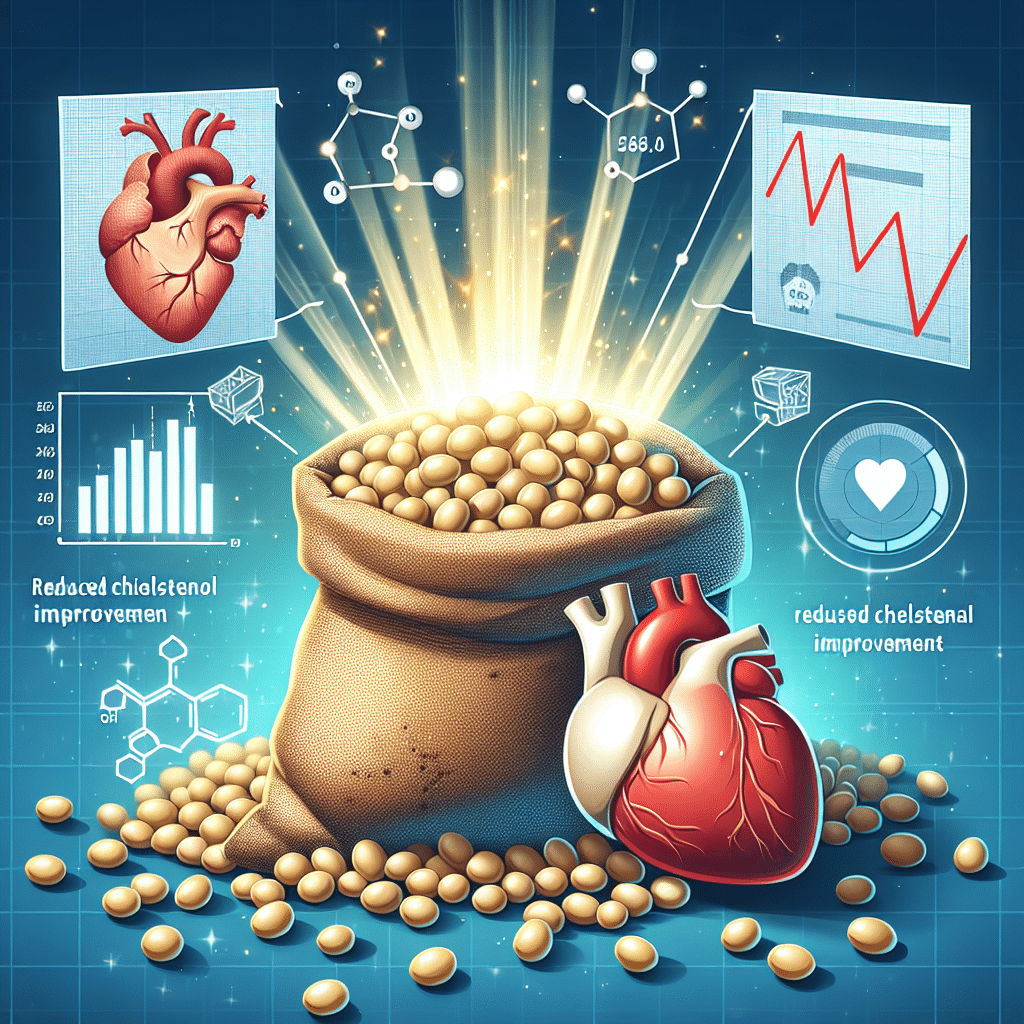Soy Protein’s Role: Cholesterol Improvement Evidence Added
-
Table of Contents
- Soy Protein’s Role in Cholesterol Management: A Closer Look at the Evidence
- The Cholesterol Conundrum: Understanding the Basics
- Soy Protein: A Plant-Based Solution to Cholesterol Improvement
- Evidence Supporting Soy Protein’s Cholesterol-Lowering Effects
- Understanding the Mechanisms Behind Soy Protein’s Impact
- Practical Applications: Incorporating Soy Protein into Your Diet
- Conclusion: Soy Protein as a Cholesterol-Lowering Ally
- Discover ETprotein’s High-Quality Soy Protein Products
Soy Protein’s Role in Cholesterol Management: A Closer Look at the Evidence

As the quest for healthier lifestyles and dietary choices continues to gain momentum, soy protein has emerged as a significant player in the field of nutrition and health. With cardiovascular diseases being a leading cause of mortality worldwide, managing cholesterol levels is a critical aspect of preventive healthcare. Soy protein has been studied extensively for its potential cholesterol-lowering effects, and the evidence supporting its role in improving lipid profiles is compelling. This article delves into the research surrounding soy protein and its impact on cholesterol levels, providing valuable insights for those looking to make informed dietary choices.
The Cholesterol Conundrum: Understanding the Basics
Cholesterol is a waxy substance found in the blood, essential for building cells and producing hormones. However, high levels of low-density lipoprotein (LDL) cholesterol, often referred to as “bad” cholesterol, can lead to plaque buildup in arteries, increasing the risk of heart disease and stroke. Conversely, high-density lipoprotein (HDL) cholesterol, known as “good” cholesterol, helps remove LDL cholesterol from the bloodstream. Balancing these cholesterol levels is crucial for maintaining cardiovascular health.
Soy Protein: A Plant-Based Solution to Cholesterol Improvement
Soy protein, derived from soybeans, is a complete protein containing all nine essential amino acids. It’s a popular alternative to animal-based proteins, especially among vegetarians and vegans. Beyond its nutritional value, soy protein has been associated with various health benefits, including the potential to improve cholesterol levels.
Evidence Supporting Soy Protein’s Cholesterol-Lowering Effects
Several studies have investigated the relationship between soy protein intake and cholesterol levels. The evidence suggests that incorporating soy protein into the diet can lead to significant reductions in total cholesterol and LDL cholesterol. Here are some key findings:
- A meta-analysis of 35 controlled trials found that soy protein consumption resulted in a significant decrease in total cholesterol, LDL cholesterol, and triglycerides, while slightly increasing HDL cholesterol.
- Research indicates that the isoflavones in soy protein may contribute to its cholesterol-lowering effects. These compounds have been shown to improve the metabolism of lipids in the liver, where cholesterol is produced and regulated.
- Case studies have demonstrated that individuals with higher initial cholesterol levels tend to experience more significant reductions when incorporating soy protein into their diets.
It’s important to note that the extent of cholesterol improvement can vary based on individual factors, such as genetics, lifestyle, and the presence of other health conditions.
Understanding the Mechanisms Behind Soy Protein’s Impact
The cholesterol-lowering properties of soy protein are believed to be multifaceted. Some proposed mechanisms include:
- Enhancing the liver’s ability to remove LDL cholesterol from the blood.
- Altering the synthesis and absorption of cholesterol in the body.
- Providing a source of protein that is low in saturated fat and cholesterol-free, unlike many animal proteins.
These mechanisms contribute to soy protein’s potential as a dietary intervention for improving cholesterol levels and reducing the risk of heart disease.
Practical Applications: Incorporating Soy Protein into Your Diet
For those looking to take advantage of soy protein’s health benefits, there are numerous ways to include it in your diet:
- Replace animal-based proteins with soy-based options such as tofu, tempeh, and edamame.
- Choose soy milk or yogurt as alternatives to dairy products.
- Use soy protein powder in shakes, smoothies, or as a supplement in baking.
It’s advisable to opt for whole soy foods and minimally processed soy products to maximize nutritional benefits and minimize added sugars, salts, and fats.
Conclusion: Soy Protein as a Cholesterol-Lowering Ally
The evidence supporting soy protein’s role in cholesterol management is robust, with research consistently showing its potential to improve lipid profiles. By understanding the mechanisms behind these effects and incorporating soy protein into a balanced diet, individuals can take proactive steps towards better cardiovascular health. As with any dietary change, it’s essential to consult with a healthcare provider to ensure it aligns with your individual health needs and goals.
Discover ETprotein’s High-Quality Soy Protein Products
If you’re looking to incorporate soy protein into your diet, ETprotein offers a range of high-quality protein products that can help you achieve your health objectives. Their soy protein offerings are characterized by a neutral taste, non-GMO, and allergen-free attributes, ensuring you receive the best in terms of both nutrition and flavor.
ETprotein’s commitment to excellence is evident in their extensive product range, which caters to various industries, including nutraceuticals, pharmaceuticals, and food and beverage. By choosing ETprotein, you’re opting for a trusted source of soy protein that is backed by rigorous quality standards and a dedication to customer satisfaction.
About ETprotein:
ETprotein, a reputable protein and L-(+)-Ergothioneine (EGT) Chinese factory manufacturer and supplier, is renowned for producing, stocking, exporting, and delivering the highest quality organic bulk vegan proteins and L-(+)-Ergothioneine. They include Organic rice protein, clear rice protein, pea protein, clear pea protein, watermelon seed protein, pumpkin seed protein, sunflower seed protein, mung bean protein, peanut protein, and L-(+)-Ergothioneine EGT Pharmaceutical grade, L-(+)-Ergothioneine EGT food grade, L-(+)-Ergothioneine EGT cosmetic grade, L-(+)-Ergothioneine EGT reference grade and L-(+)-Ergothioneine EGT standard. Their offerings, characterized by a neutral taste, non-GMO, allergen-free attributes, with L-(+)-Ergothioneine purity over 98%, 99%, cater to a diverse range of industries. They serve nutraceutical, pharmaceutical, cosmeceutical, veterinary, as well as food and beverage finished product distributors, traders, and manufacturers across Europe, USA, Canada, Australia, Thailand, Japan, Korea, Brazil, and Chile, among others.
ETprotein specialization includes exporting and delivering tailor-made protein powder and finished nutritional supplements. Their extensive product range covers sectors like Food and Beverage, Sports Nutrition, Weight Management, Dietary Supplements, Health and Wellness Products, and Infant Formula, ensuring comprehensive solutions to meet all your protein needs.
As a trusted company by leading global food and beverage brands and Fortune 500 companies, ETprotein reinforces China’s reputation in the global arena. For more information or to sample their products, please contact them and email sales(at)ETprotein.com today.














